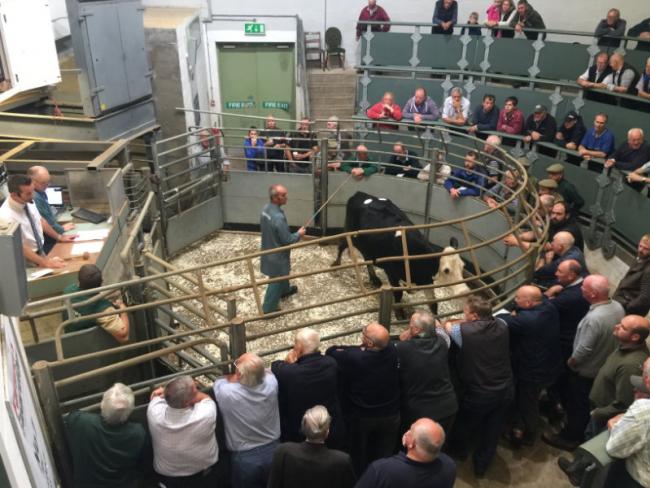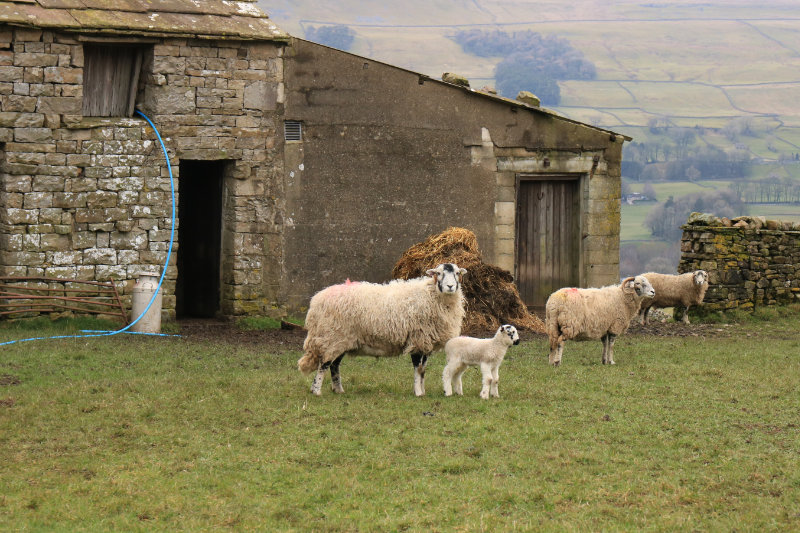24 February 2024

Bakewell auction market. Farmers are finding it hard to get good prices in the face of cheap imports. Photo Workers.
Farmers across Britain are under attack from capitalism and its willing servants in government. But the Scots, the Welsh and the English – the British – farmers are starting to defend our national food supply. Without that we can’t be an independent nation.
They are angry that behind claims of “sustainable” farming, “caring” for the natural environment, and “affordable” food, the importance of food production is ignored or marginalised. Whether that is taking agricultural land out of use or promoting cheap imports, the effect is the same.
Addressing the National Union of Farmers on 20 February, the prime minster Rishi Sunak claimed that food security was a priority and announced measures to support the industry. Outgoing NFU president Minette Batters pointed out this was “old money”, but she thought his speech marked a definite step-change.
“Empty promises”
This took place against the background of growing protests by farmers. And Kelly Seaton, one of those listening to Sunak, said to GB News that his announcements are “likely to be empty promises”.
In England, farmers are particularly concerned about imports. Driving slowly and carrying “No More Cheap Imports” signs, more than 40 tractors and other farm vehicles blocked roads around the Kent port of Dover for several hours on the evening of Friday 9 February.
Simmering
Other smaller demonstrations have followed – for example in a Tesco car park near Dover on 19 February. Kent farmers are discussing further action. They may be joined by other campaigns fuelled by farmers’ simmering discontent.
Last October farmers in Somerset attempted to block a Morrisons distribution centre in Bridgwater under a banner that said “Proud to Farm”.
Other campaigns have started up with similar themes, including Get Fair About Farming, which was set up last year by the founder of organic vegetable-box company Riverford, Guy Singh-Watson, with a petition debated in parliament last month.
Support
Andrew Gibson, who helped organise the Dover protest with his brother Jeff, said: “We’ve had support from all round the country. There will be other groups like us and they will make their presence felt – around the docks, around supermarket distribution centres.”
‘A loaf makes 9p for a cereal farmer.’
The first protest was spontaneous but the response was “brilliant”, Gibson said. He cited tariff-free wheat from Ukraine and cheap lamb from New Zealand among the reasons for farmers protesting. His brother Jeff told Radio 4’s Today programme that since Brexit it seemed harder to export from the UK, but with no change to importing.
Sustain, the food campaigners, warned in 2022 that UK farmers make very low profits from food they produce. A loaf of bread was worth 9 pence profit for a cereal farmer while a £2.50 block of cheddar was worth less than a penny for dairy farmers.

Since then, trade deals with Australia and New Zealand have come into force. Andrew Gibson said he had tried to buy British lamb in his local supermarket and found none.
“The ethics are just appalling,” he said. “How you get a leg of lamb from New Zealand, the other side of the world, and sell that for £15 or £20 – it’s mind-boggling.”
He added, “We’re getting a lot of produce from around the world that would be illegal to grow in this country,” he added. “We produce the best stuff to the highest standard. We just want a level playing field.”
If the government really were concerned about our food supply, or nature, it wouldn’t be attacking the farmers, making their already difficult job even harder, and reducing still further the land currently used for agriculture.
Destructive
Instead attention needs to turn to factors destructive to farmland such as greenfield housing development, (even as our city centres are left to degenerate), commercial woodland expansion (more than doubled over the past 20 years) and other non-agricultural uses such as golf courses. And now in pursuit of net zero targets, solar farms.
Care is needed in building transport infrastructure and in mineral extraction, and resources put into reclaiming land lost to the sea (the Dutch manage it). Land under agricultural use is already is dwindling rapidly – by approximately 64,000 acres per year over the past two decades.
‘Attacks on farming threaten food security and independence.’
Attacks on farming are real threats to our food security and therefore to British independence as a nation. So too are the destructive food import deals the government allows – encourages – with international companies where animal welfare and labour standards are lower.
Forgotten
Batters summed up the problem in an interview with The Times on the day of Sunak’s speech. She said that “We should be leading the way post-Brexit and farmers can show how we can deliver for nature and net zero by 2040, but politicians seem to have forgotten that we can’t just focus on the environment.”
“We also need to produce food. It’s astonishing that there is no mention of growing fruit or vegetables in our new farm subsidies. The government just don’t seem to care about food security and it panics me.”
